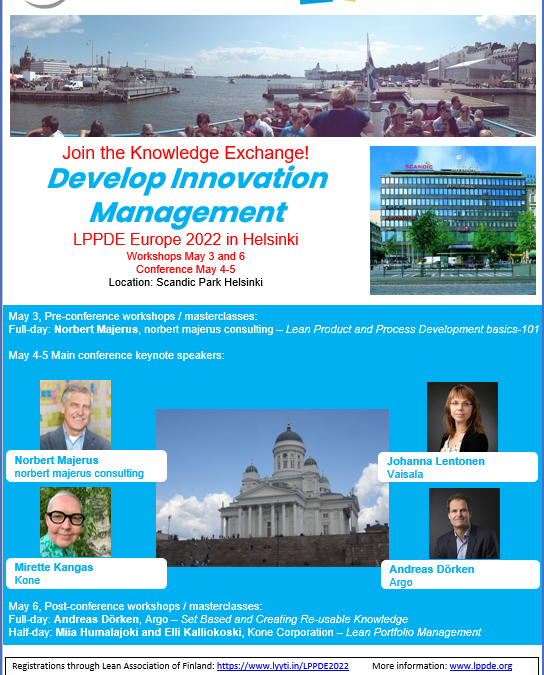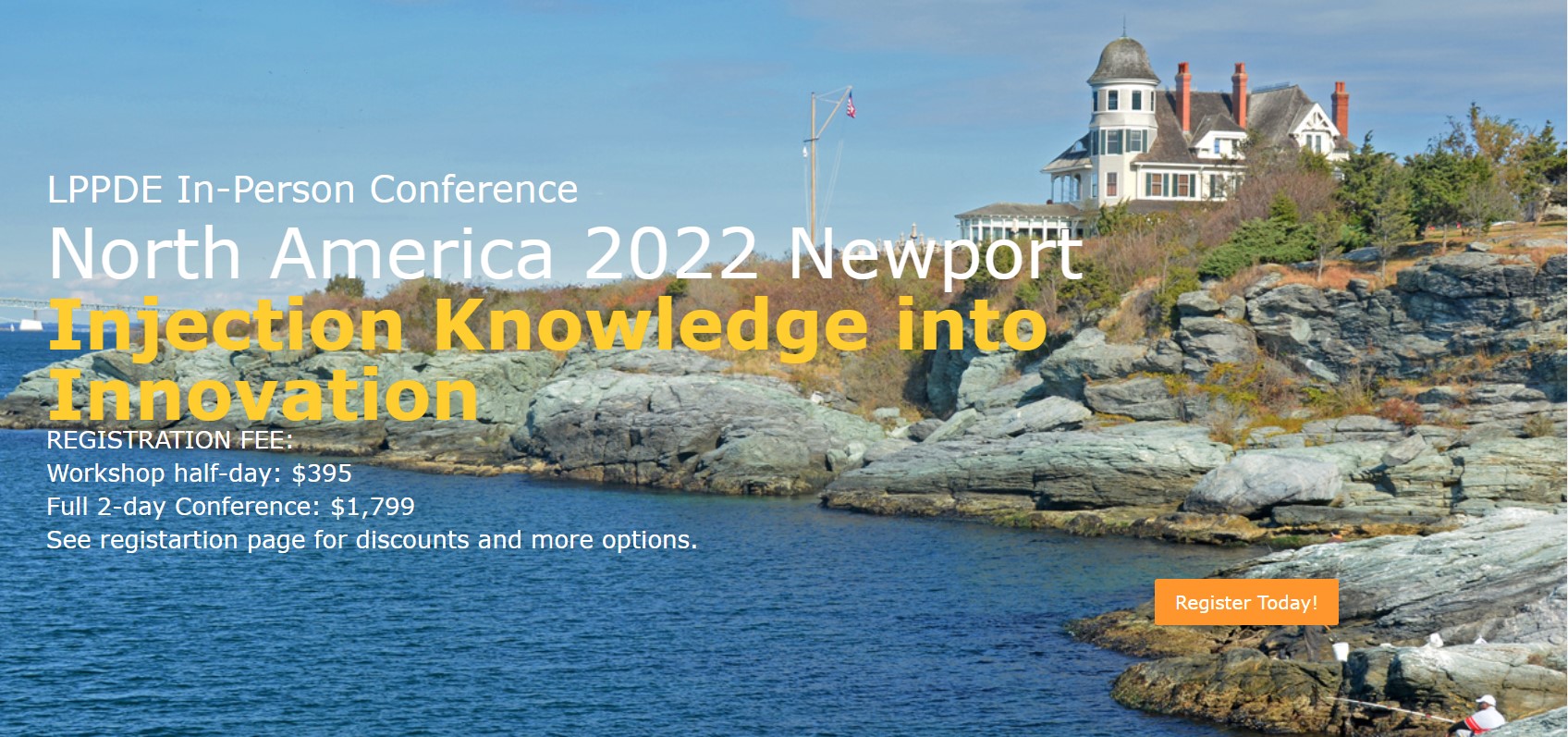As usual the journey from idea to final conference is a long one, this time much longer though. That is if we talk about the physical, in-person, conference. The first plan to have an in-person conference in Helsinki was for May 2020 where we postponed the conference to September to avoid the terrible pandemic of COVID-19, but we ended up doing it virtual. Next shot was Helsinki 2021 in May, same thing, the pandemic continued.
But surely this time, in 2022, when we have relaxed most of the anti-pandemic actions… Actually I almost missed to have the document of my vaccinations updated which they thoroughly checked at the Helsinki airport.
We also had the “usual” problems with speakers dropping out just weeks before the conference and having to identify suitable replacements. I am lucky to have very qualified colleagues who gladly stepped in and delivered fantastic presentations.
Arriving at Helsinki
Our partner Juha Tammi met at the airport and after the interesting comment when you meet for the first time in real life “you are taller in real life”, Juha answered “you too”. Together we walked to the first terminal to wait for the conference co-chair Christer Lundh. After checking in at the hotel we went for the bar to have a beer where we found Norbert Majerus waiting with a glass of wine. Great and creative discussions in the first reunion of the summit.
Pre-conference workshop May 3rd
Norbert Majerus – Lean Product and Process Development basics – 101. This workshop introduces the participants to the foundational principles of lean product and process development. It is targeted for newcomers to the community to help get them up to speed on some of the basic concepts so they can get the most from the conference.
As usual Norbert mixes his high energy with great story-telling adding the question “is this what you want to hear about or should we change?”. This makes the workshop useful for all attendees, those with short experience as well as those with much longer. As Norbert focuses on the prerequisites of a good lean product development process giving examples all the way and spicing the workshop with some simulations where the participants could test the theories in a practical way.
A great start of the learning week! My old colleague Bengt Johansson from ASSA ABLOY showed up, so we were a nice group for the ‘Exchange’ in the bar after dinner.
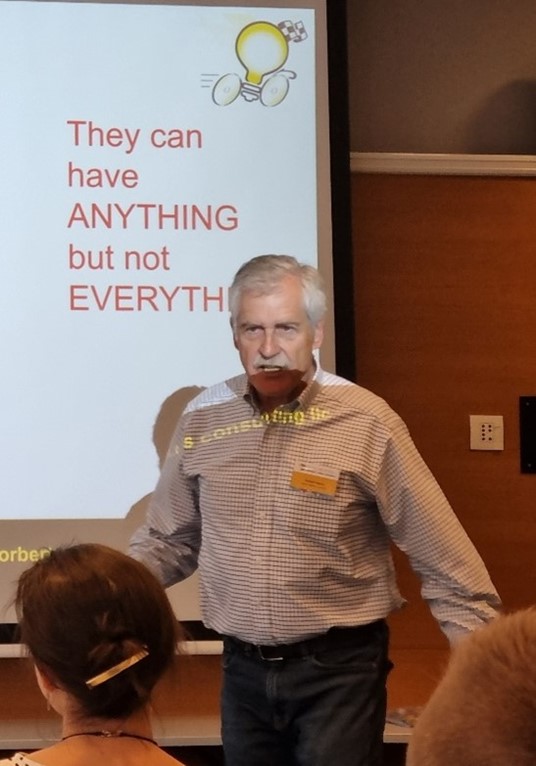
Wednesday, May 4th Lean Innovation Conference – Day one
As I had the honor of being conference chair I welcomed everybody to start the event. We had a group of twenty-five anxious learners ready for a great Exchange.
First keynote was Norbert Majerus, norbert majerus consulting – Making the Case for Lean Driven Innovation. Norbert spoke about why we should change and why we should invest in a Lean Driven Innovation way of working. During his presentation he also touched some of the presentations in his new book, Winning Innovation.
Second keynote was Mirette Kangas, Kone – It´s an Ultramarathon. 10 Key Lessons Learned About Lean – Agile Transformation as a Change Leader. Mirette shared her experience on agile transformations in a very inspiring way whilst reflecting on the reasons for problems and how to overcome the challenges.
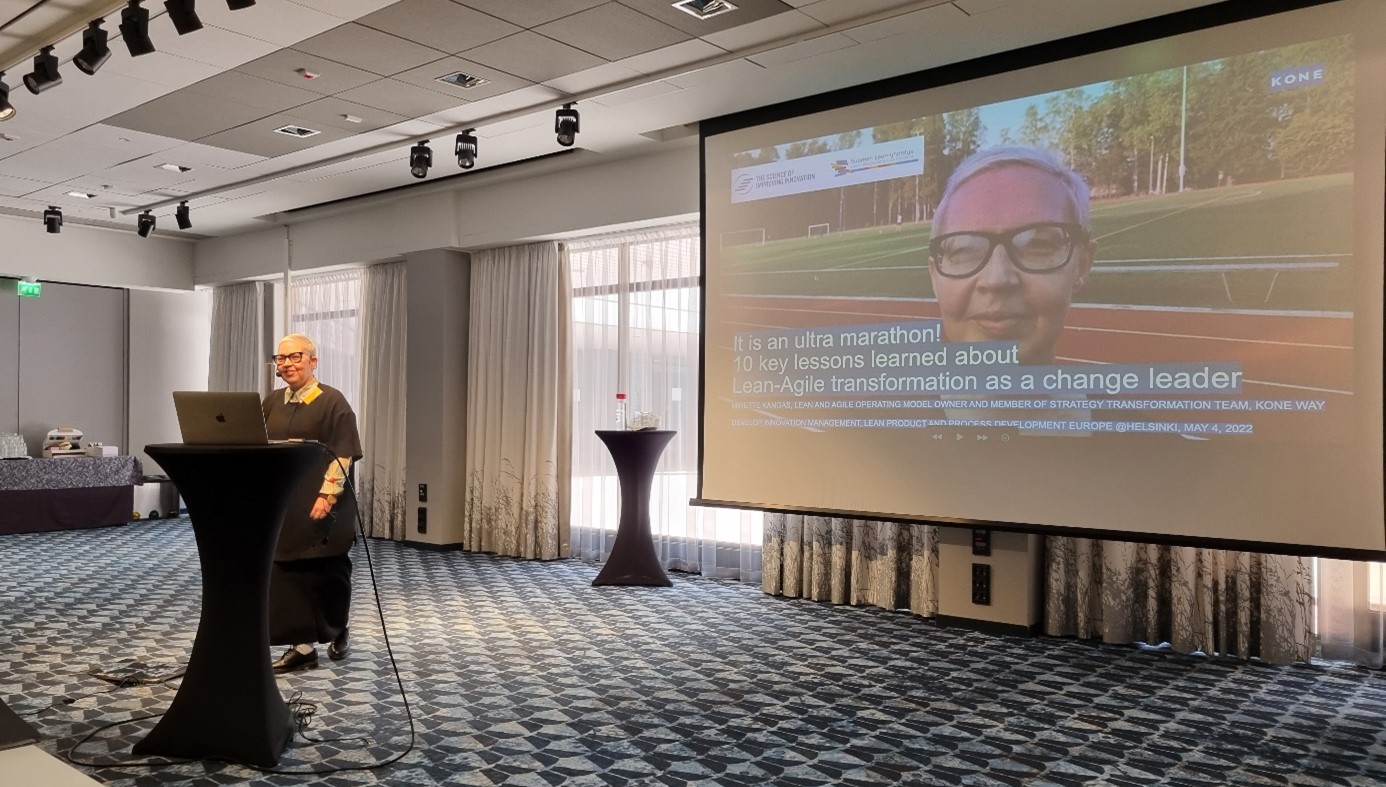
Matti Posti, Lappset – On the Way to Speed Up Prototyping followed presenting a case of their ongoing work to speed up the prototyping process. He touched on the Lappset Lean journey and the learnings and challenges in the their efforts.
The networking lunch came quickly and passed even faster getting to know some new friends and reflecting on the learnings from the morning session.
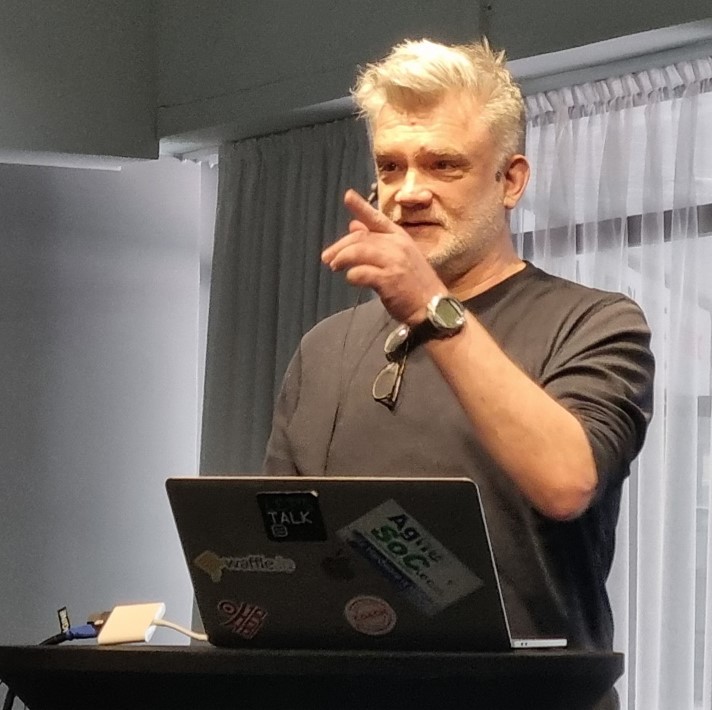
Eager to hear more about the journey ABB has done to date I returned and found Mikko Kaijärvi, ABB waiting.
His presentation A Practical Approach to Apply Agile to Hardware Projects was just as good as I expected. While many companies struggle with how to apply agile mindset and methods to the hardware part of the company. The basic approach ABB has is organic growth of Agile practices in hardware development. Mikko went through examples of the empowerment needed to make it work in combination with learning by doing and not copying “agile” but build on the existing system at ABB. He also stressed the importance of management, culture, psychological safety and managing complexity. Mikko gets his inspiration by finding new ways of doing things better, be it at design or team management or cultural change in organization.
Mikko Koho, Ponsse, followed with Continuous Improvements in Processes. “Continuous improvement in production processes and capacity” was the topic and Mikko shared practices of and experiences and learnings from developing Ponsse’s production and supply chain.
Jukka Borgman, Valmet – Valve Sprints. Valve Sprints is a global process for planning, prioritizing, allocating, and reporting product development work. The process is inspired by Agile and Lean principles. Valves Sprints should inspire us in developing our own processes around product development work to keep deadlines and improve our capacity.
Pascal Papathemelis, agile42 – Good Intentions but Weak Results, Cases of Static Flow - It Does Not Need to Be This Way finished the day. In many organizations the teams work effectively but overall, the organization struggles to get results out to the customers. Managers engage with good intentions but make things worse. As a result, it feels the organization is not moving forward as little value is generated and the business is stagnating. Pascal shared his experiences on how to avoid the problems and how to create a culture of continuous improvement on the portfolio of ongoing initiatives and value delivery.
That was the end day one which continued in a new Exchange group with dinner, walking and drinks.
Wednesday, May 5th Lean Innovation Conference – Day two
On the second day of the conference Christer Lundh, conference co-chair, made a nice summary and reflections on the previous day and introduced the days first keynoter: Johanna Lentonen, Vaisala – Lean Leadership in Real Life
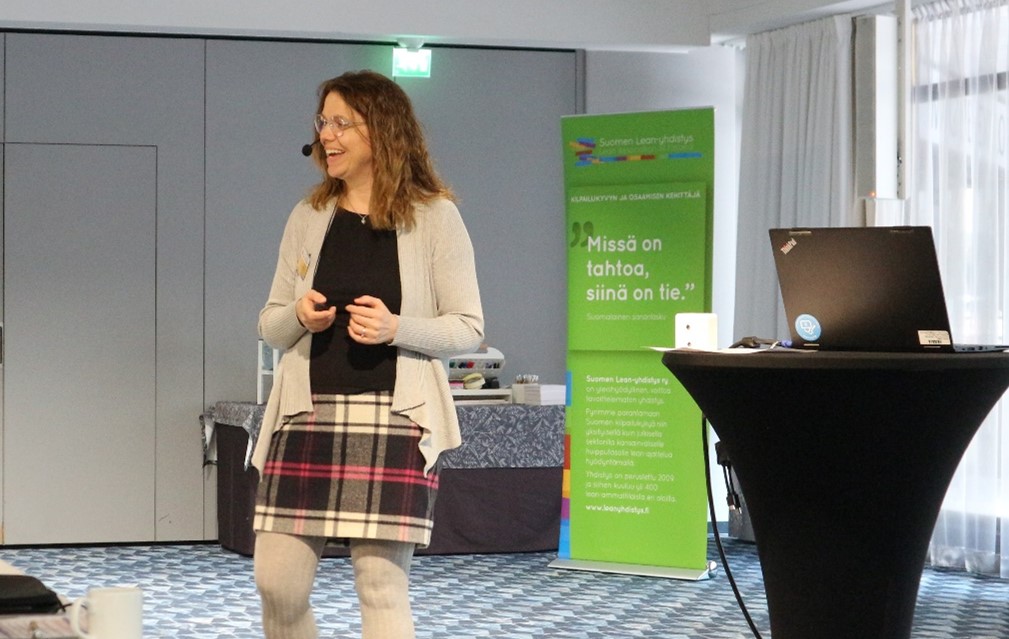
Johanna shared her experiences on how good leadership can be a great catalyst for success. Great products need innovations, innovations need an inspirational environment; effective frameworks and good leadership to unleash the potential of smart people. Johanna’s passion is to build great products and make a difference to this world. Ever since 2009 she has been fascinated by Lean Product Development and consequently reflecting and applying the principles of LPPD in the leadership domain. She shared both her personal insights and experiences on leadership and practical implementations in Vaisala, with intention to provide food for thought and excitement for all those interested in becoming better leaders.
Next challenge was the second keynote who called the day before to tell us he had COVID -19 and could not travel! So I asked if he was well enough to manage a virtual presentation and he was! So, we got a virtual Andreas Dörken, Argo – Developing LPPD and the Challenges with Agile.
Andreas has worked closely with one of our board members, Dantar Oosterwal, and continued to develop their Product Development model 6+1. In recent years Agile has become more popular in the market and challenges the known methods in Lean Product and Process Development. Andreas reflected on the challenges that come with agile and how to build an even stronger system. I found it very interesting when we compare the same actions but with different words as well as how companies can take advantage from both aspects.
Jarno Poskela, Neste – Lean driven process development at Neste Innovation followed. His innovation excellence unit includes competence teams for portfolio & program management, IPR, and development & processes. The development & processes team drives effectiveness and efficiency across the innovation organization, especially focusing on innovation capability, process development, continual improvement, and digitalization.
During the second networking lunch we continued learning together. As the chair of the conference, I made a Closing Address about the theme Develop Innovation Management. I reflected on my experience that what is most important for true innovation is
- More time for think
- Time pressure to come up with a result
Which I also wrote about in a recent blog post.
The conference ended with a mini-workshop: Mission Command in Technology Development Context presented by Christer Lundh, AUFERO
Christer reminded us that speed has become an increasingly more important foundation for successful innovation and technology development. To achieve speed and potential of Agile and Lean in technology development, leaders have a lot of valuable learnings to make from the leadership philosophy of Mission Command. Its origin from ‘Auftragstaktik’ has proven its worth for over two centuries, it is still a modern leadership principle.
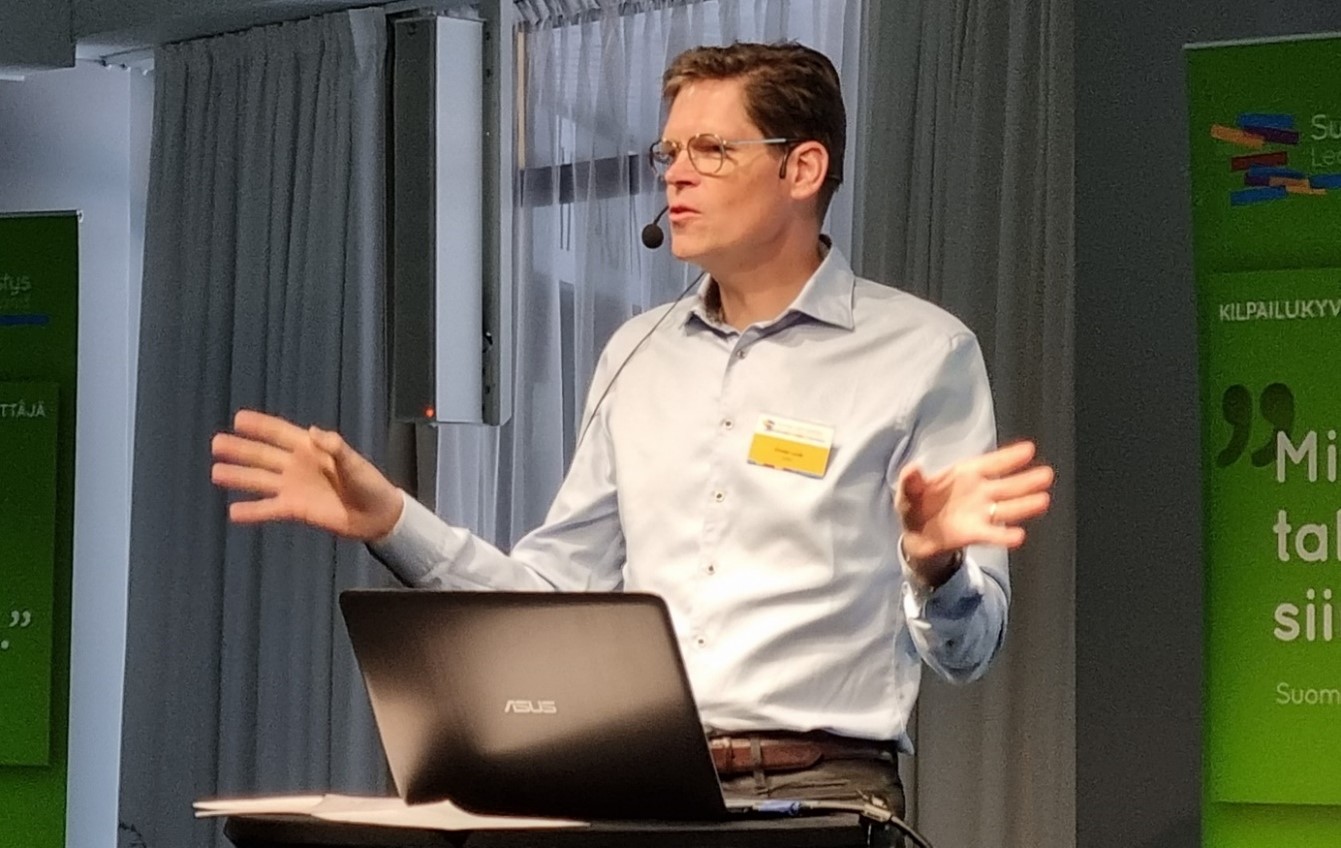
Auftragstaktik is a German expression describing a rapid military tactic, designed to dismantle enemy forces through the use of mobile forces. Those who recognize the turbulent nature of innovation and technology development at speed, Mission Command principles provides for fast, flexible, and decisive action in a complex environment characterized by uncertainty, fluidity, and rapid change.
Leader's that apply Mission Command, informs what his / her intention is, sets clear achievable objectives. It is the leader’s responsibility to specify the objective and the framework within which the subordinates must accomplish the mission. The leader provides all resources required to carry out the mission. Acting based on an intent empowers subordinates’ decision-making, decentralized execution and provide room for initiatives appropriate to the situation. The planning and execution itself become the executor’s responsibility. Together the leader and their teams represent the strong bond and mutual trust, built through shared values and experiences of overcoming adversity. Hereby the whole organization attain speed and start creating outcomes beyond the means.
Christer alternated theoretical examples with his own experience from leading according to the theories. A very thought-provoking and reflective mini-workshop with lots of new ideas of how we can improve our management style. To motivate us more Christer covered the differences in ‘Mission Command’ and ‘Command and Control,’ and reflected in a Technology Development context.
A great ending of the conference.
Post-conference workshop May 6th
Andreas Dörken, Argo – Set Based and Creating Re-usable Knowledge. Andreas, still with COVID did a wonderful work with the interactive workshop on these very important themes, supported onsite by Christer Lundh. He managed having an interactive workshop where we practiced and learned more about Set Based thinking in theory and practice as well as how to create re-usable knowledge in your product and process development.
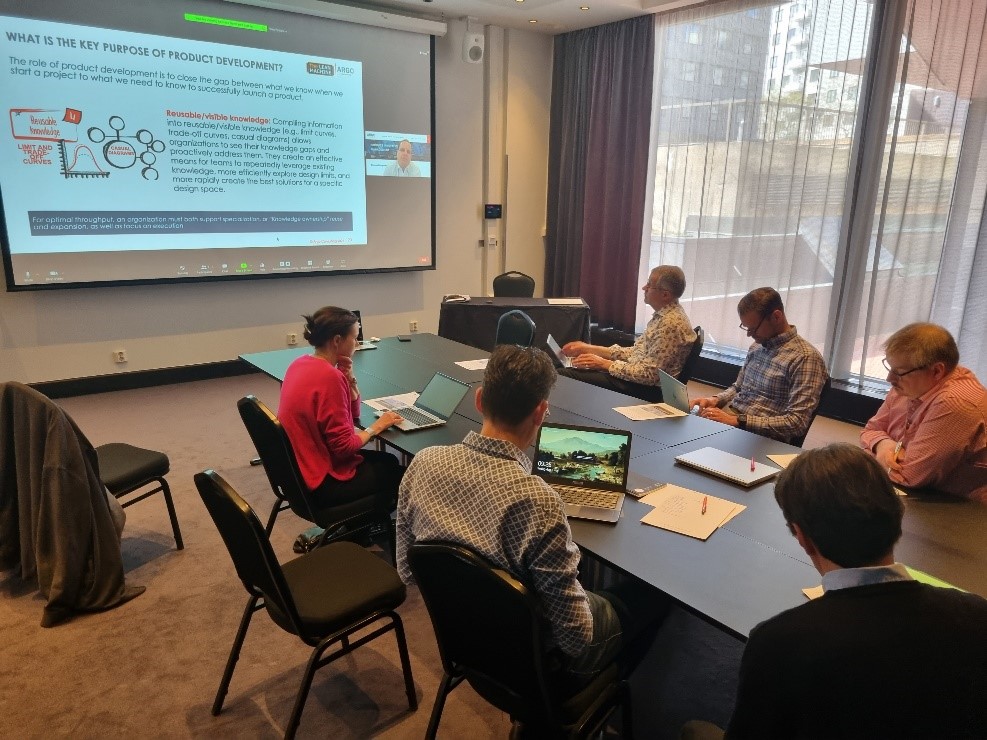
In parallel to that workshop Miia Humalajoki and Elli Kalliokoski, Kone Corporation had a half-day workshop on Lean Portfolio Management
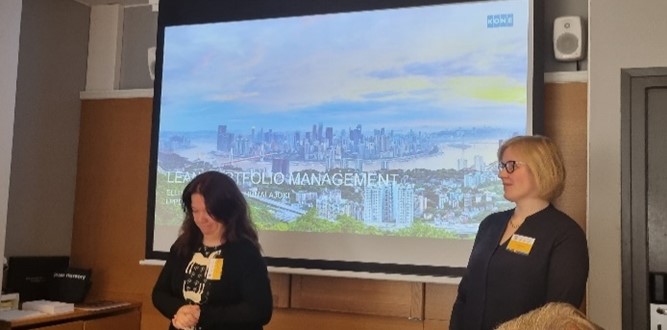
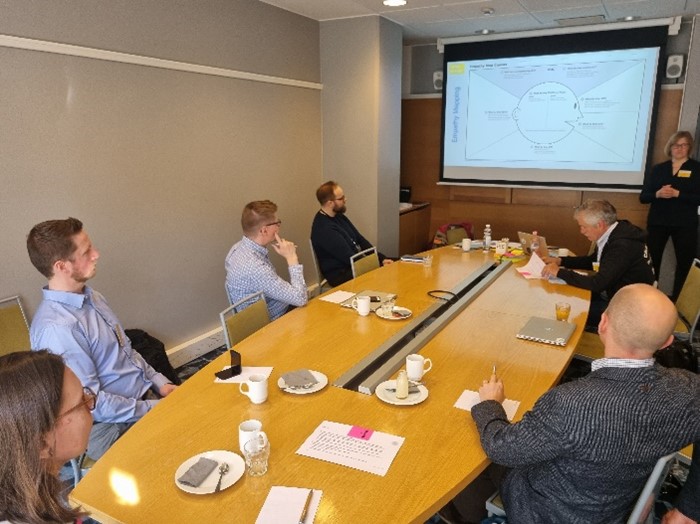
During the last years at Kone, a global leader in the elevator and escalator industry, Miia Humalajoki and Elli Kalliokoski developed a new method for portfolio management. The goal was to create: “A dynamic process through which organizations select the priorities that align with their corporate strategy and will yield the highest return on investment and customer value through optimal resource allocation” – Gartner. During the mini-workshop Miia and Elli guided us through how they did it and the major problems they encountered. As well as practicing some of the tools they used.
Final Reflections
It was a nice conference with a small but highly engaged audience. There was still worrying about the risks from COVID as well as the ongoing war from Finland’s neighbor which reduced attendance.
The participants went home filled with energy and many new ideas to test and introduce. All speakers stressed the importance of avoiding copying exact methods and to adapt new things to the company culture which seems like a very logical key takeaway.
Already looking forward to the North American conference this October in Rhode Island.
Do you agree we should adapt the “new” methods to the current culture or should one copy the entire system?
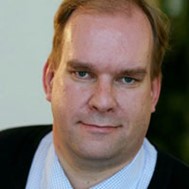
Peter Palmér
Transformation Office at Scania Group
Upcoming Knowledge Exchange
October 3-6, 2022 in Newport, RI
Join us to learn how you can increase your innovation speed, eliminate waste in your processes, and lead your team to new levels of productivity and pride. Meet people like yourself who are striving for innovation excellence. Learn what works for them. Share your challenges and successes. We want to exchange ideas with you, so we all learn to innovate faster.
Hear keynote from Bruce Hamilton of GBMP on “Developing your Teams to Accelerate your LPPD Innovation.” Meet Durward Sobek, co-author of the book, Lean Product and Process Development. And many others with deep expertise in lean product development. See the full program at LPPDE NA 2022.

